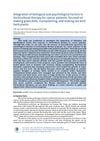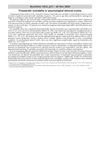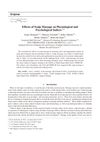Search
for
Sort by
Research
480-510 / 1000+ results
research Alopecia Areata's Psychological Impact on Quality of Life, Mental Health, and Work Productivity: A Scoping Review
Alopecia areata severely impacts quality of life, mental health, and work productivity.

research Common Physiological and Psychological Problems Among Post-Bariatric Surgery Patients
Post-bariatric surgery patients often face gastrointestinal issues, fatigue, dry skin, hair loss, and anxiety.

research Integration of Biological and Psychological Factors in Horticultural Therapy for Cancer Patients: Focused on Making Grass Dolls, Transplanting, and Making Tea with Herb Plants
Horticultural therapy helped cancer patients feel hopeful and positive about their disease experience.

research Finasteride: Suicidality or Psychological Adverse Events
Finasteride use linked to increased suicidality in patients under 45.
research A Study of Psychological Aspects of Patients Undergoing Hair Transplantation for Androgenetic Alopecia

research Polycystic Ovary Syndrome: A Complex Condition with Psychological, Reproductive, and Metabolic Manifestations That Impacts Health Across the Lifespan
Polycystic ovary syndrome is a complex condition that affects women's mental, reproductive, and metabolic health throughout their lives.

research Female Type of Adult Acne: Physiological and Psychological Considerations and Management
Adult female acne requires a comprehensive treatment approach, including medical options and lifestyle changes, with attention to psychological well-being.

research Effects of Scalp Massage on Physiological and Psychological Indices
Scalp massage reduces stress, increases relaxation, and improves blood circulation.

research Impact of Yoga Nidra on Psychological Variables in Women with Polycystic Ovarian Syndrome
Yoga Nidra improves well-being and reduces anxiety in women with PCOS.

research The Lived Experience of Women with Alopecia: A Qualitative Study Investigating the Psychological, Social and Emotional Impact of Alopecia in Greek Women
Alopecia greatly affects Greek women's daily life, relationships, and self-image, with mixed social support and dissatisfaction with treatments.

research Female Pattern Hair Loss and Negative Psychological Impact: Possible Role of Brain-Derived Neurotrophic Factor
Women with Female Pattern Hair Loss may experience more stress, anxiety, and depression, and have lower levels of BDNF, which could predict the psychological impact.

research Hair Loss as a Symptom of Many Complex Medical and Psychological Problems
Hair loss can indicate various health issues, including serious diseases, hormonal imbalances, and can significantly affect personal life and mental health.

research Male Androgenic Alopecia: Review of Current Knowledge and Socio-Psychological Impact
Male pattern baldness affects social interactions and mental health, and while treatments are being explored, hair transplants are currently the most effective solution.

research Androgenetic Alopecia in Women as an Aesthetic and Psychological Problem
Hair loss in women can cause beauty and mental health problems, and there are various treatments available.

research Scalp Hair Regrowth Is Associated With Improvements in Health-Related Quality of Life and Psychological Symptoms in Patients With Severe Alopecia Areata: Results From Two Randomized Controlled Trials
Regrowing scalp hair improves quality of life and reduces anxiety and depression in severe alopecia areata patients.

research Review on Alopecia: Disease and Characteristics, Clinical Evaluation, Psychological Impact, and Available Treatment Options
Alopecia causes patchy hair loss and can be diagnosed with new techniques; treatments like strong creams and contact immunotherapy can help.

research The Role of Polycystic Ovarian Syndrome in Chronic Inflammation, Psychological Health, and the Gut Microbiota State: A Case Report
Polycystic Ovarian Syndrome (PCOS) can cause chronic inflammation, mental health issues, and changes in gut bacteria, but a holistic lifestyle change can significantly improve these conditions.

research Alopecia Areata Is Characterized by Dysregulation in Systemic Type 17 and Type 2 Cytokines, Which May Contribute to Disease-Associated Psychological Morbidity
Alopecia areata involves immune system imbalances that may lead to depression and anxiety.

research Insights Into Alopecia Areata: A Systematic Review Of Prevalence, Pathogenesis, And Psychological Consequences
Alopecia Areata affects people of all ages worldwide, is likely caused by genetic and environmental factors, and can lead to stress and depression, highlighting the need for treatments that address both physical and mental health.

research Primary Cicatricial Alopecia: Diagnosis and Treatment
Primary cicatricial alopecia, a rare disorder causing permanent hair loss, is hard to diagnose and treat, with treatments like anti-inflammatory drugs and steroids offering varied results and no guaranteed cure. Psychological support for patients is important, and future research should aim to identify causes of the condition.
research Reported Experiences of Persons with Alopecia Areata
People with alopecia areata often experience negative personal, social, and medical impacts, and need psychological support.

research Dermatological Symptoms and Sexual Abuse: A Review and Case Reports
Skin problems can be linked to sexual abuse, requiring careful medical and psychological evaluation.

research Integrated Model of Care for Polycystic Ovary Syndrome
The document concludes that women with PCOS need a comprehensive care model that covers reproductive, metabolic, and psychological health to improve their quality of life.

research Alopecia Areata in the Indian Subcontinent
The conclusion is that in the Indian subcontinent, socioeconomic status, stress, and family structure affect the severity of alopecia areata, and its psychological impact is generally mild or moderate.

research Hair Transplantation in Females
Hair transplantation is a viable treatment for some types of female hair loss, with careful donor assessment and attention to psychological factors.

research Hair Loss And Its Management In Children
The document concludes that early diagnosis and a comprehensive treatment plan are crucial for managing hair loss in children, with a focus on both medical and psychological support.

research Study of Quality of Life in Patients with Premature Graying of Hair in Western Indian Population
Premature graying of hair significantly harms psychological and social wellbeing.

research Three Cases of Hair Loss Analyzed from the Perspective of Analytical Psychology
Psychological stress and personal history are significant factors in hair loss.

research Beneath the Surface: Dermatology and Psychiatry
Skin diseases can cause psychological issues, and better integration of dermatology and psychiatry is needed to improve patient care.